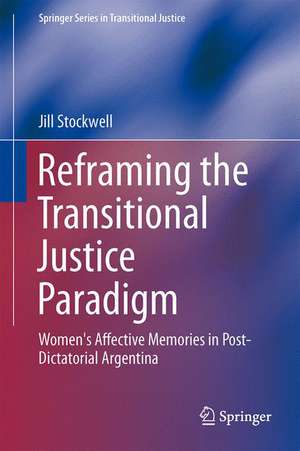Reframing the Transitional Justice Paradigm: Women's Affective Memories in Post-Dictatorial Argentina: Springer Series in Transitional Justice, cartea 10
Autor Jill Stockwellen Limba Engleză Hardback – 10 feb 2014
In direct contrast to the nominally objective and universalist sensibility that traditionally has driven transitional justice endeavours, this volume examines how affective memories of trauma are a potentially disruptive power within the reconciliation paradigm—and thus affect should be taken into account when considering transitional justice. Accordingly, Cultures of Remembrance for Women in Post-Dictatorial Argentina is an excellent resource for those interested in human rights, transitional justice, clinical psychology and social work, and Latin American conflicts.
| Toate formatele și edițiile | Preț | Express |
|---|---|---|
| Paperback (1) | 635.01 lei 43-57 zile | |
| Springer International Publishing – 27 aug 2016 | 635.01 lei 43-57 zile | |
| Hardback (1) | 641.03 lei 43-57 zile | |
| Springer International Publishing – 10 feb 2014 | 641.03 lei 43-57 zile |
Preț: 641.03 lei
Preț vechi: 754.15 lei
-15% Nou
Puncte Express: 962
Preț estimativ în valută:
122.67€ • 127.30$ • 102.54£
122.67€ • 127.30$ • 102.54£
Carte tipărită la comandă
Livrare economică 17-31 martie
Preluare comenzi: 021 569.72.76
Specificații
ISBN-13: 9783319038520
ISBN-10: 3319038524
Pagini: 184
Ilustrații: XII, 170 p. 2 illus., 1 illus. in color.
Dimensiuni: 155 x 235 x 17 mm
Greutate: 0.44 kg
Ediția:2014
Editura: Springer International Publishing
Colecția Springer
Seria Springer Series in Transitional Justice
Locul publicării:Cham, Switzerland
ISBN-10: 3319038524
Pagini: 184
Ilustrații: XII, 170 p. 2 illus., 1 illus. in color.
Dimensiuni: 155 x 235 x 17 mm
Greutate: 0.44 kg
Ediția:2014
Editura: Springer International Publishing
Colecția Springer
Seria Springer Series in Transitional Justice
Locul publicării:Cham, Switzerland
Public țintă
ResearchCuprins
Chapter 1 Introduction.- Chapter 2 Historical Factors.- Chapter 3 Remembering the Military Dictatorship and Its Aftermath.- Chapter 4 Politics of Remembering Armed Guerrilla Violence Chapter.- 5 Deep Memory Chapter.- 6 Social Forces Shaping Memory Transmission Chapter.- 7 Haunting Chapter.- 8 Conclusion.
Notă biografică
Jill Stockwell is a social researcher with expertise in the impact of conflict on individuals and societies. Her current research interests include memory studies, transitional justice studies, affect, trauma, testimony, and Latin American studies. She recently completed her PhD with the Institute of Social Research at the Swinburne University of Technology as part of the research team on the project, ‘Social Memory and Historical Justice: How Democratic Societies Remember and Forget the Victimisation of Minorities in the Past’.
Textul de pe ultima copertă
This volume explores the evolving and complex memorial consequences of political and state violence in post-dictatorial Argentina. Specifically, it looks at the power and significance of personal memories of trauma and loss of two groups of women who represent antithetical versions of the recent Argentinian past: those affected by military terror and those affected by armed guerrilla violence. This volume contends that we need to look beyond political and ideological contestations to a deeper level of how memorial cultures are formed and sustained. It argues that we cannot account for the politics of memory in modern-day Argentina without acknowledging and exploring the role played by individual emotions and affects in generating and shaping collective emotions and affects. Drawing on first-hand oral testimony taken from Argentinian women who experienced the political violence and state terror of the 1970s and 1980s, the research in this volume aims at understanding how their affective memories may be a different source of insight into the ongoing, deep animosities within and between Argentine memorial cultures.
In direct contrast to the nominally objective and universalist sensibility that traditionally has driven transitional justice endeavours, this volume challenges the current transitional justice framework and examines how affective memories of trauma are a potentially disruptive power within the reconciliation paradigm. Accordingly, Reframing the Transitional Justice Paradigm: Women’s Affective Memories in Post Dictatorial Argentina is an excellent resource for those interested in human rights, transitional justice, social memory, cultural studies, clinical psychology and social work, and Latin American conflicts.
In direct contrast to the nominally objective and universalist sensibility that traditionally has driven transitional justice endeavours, this volume challenges the current transitional justice framework and examines how affective memories of trauma are a potentially disruptive power within the reconciliation paradigm. Accordingly, Reframing the Transitional Justice Paradigm: Women’s Affective Memories in Post Dictatorial Argentina is an excellent resource for those interested in human rights, transitional justice, social memory, cultural studies, clinical psychology and social work, and Latin American conflicts.
Caracteristici
Examines the role of individual emotions in forming collective memories in Argentina Draws upon first-hand oral testimonies from Argentinian women Synthesizes the existing body of literature to trace the traumatic historical events in Argentina Includes supplementary material: sn.pub/extras






















